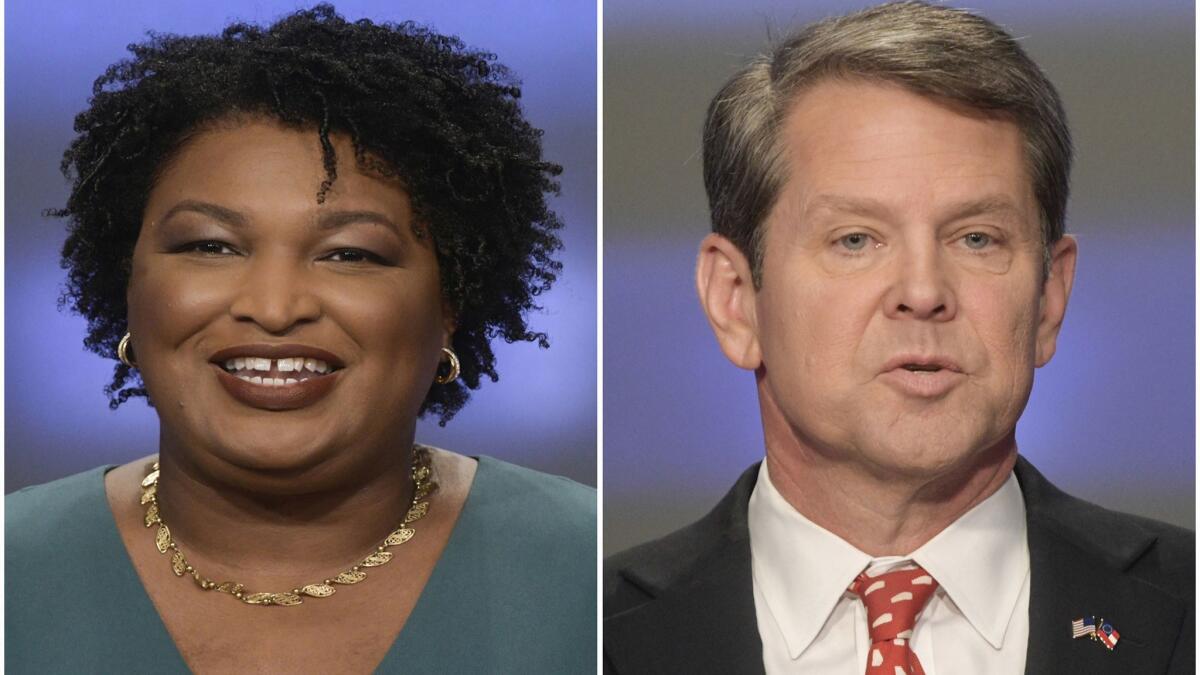Voting rights conflicts in Georgia and other states could make a difference in the Nov. 6 election

One of the most bitterly contested races in the Nov. 6 election is in Georgia, where the gubernatorial campaign pits Secretary of State Brian Kemp, a white Republican, against Stacey Abrams, a Democrat who is vying to become the state’s first black governor.
The race became especially heated this week when voting rights advocates filed a lawsuit accusing Kemp, the state’s top election official, with blocking more than 50,000 voter registrations — mostly of black residents — to hurt turnout and boost his campaign.
Kemp’s campaign has denied the accusation. The state is among several with laws that require exact matches between personal information on voter registrations and state databases.
Abrams’ campaign has called on Kemp to resign, and spokeswoman Abigail Collazo said Thursday that he was “maliciously wielding the power of his office to suppress the vote for political gain.”
The Georgia dispute is among several in various states that voting rights advocates have zeroed in on because of what they describe as restrictive voting laws, changes to early voting rules and polling place closures. They point to studies that show voter fraud is rare in the U.S.
The conflicts are often drawn along party lines, with Democrats saying voter suppression is at play and Republicans saying changes in voting procedures prevent fraud.
On Tuesday, the U.S. Supreme Court declined to toss out a law that requires North Dakota voters to show identification with a current residential address. Voting rights groups said the law will hurt the state’s Native American voters, as many of them live on reservations and do not have standard addresses.
On Wednesday, a federal judge in Ohio upheld the state’s system for purging those who haven’t voted in six years from its registration rolls. Civil rights groups in the state, home to high-profile House, Senate and governor races, said the rule hit hard in districts with Democratic voters.
On Thursday, an Arkansas state court upheld a law that makes voters show photo identification at the polls. The law lets them use provisional ballots if they have no ID. Democrats are vying to gain at least one of the state’s four seats in the U.S. House of Representatives, all held by Republicans.
At issue in several states are changes to the Voting Rights Act of 1965. The Supreme Court struck down key parts of the act in 2013 that required certain states — largely ones in the South with a history of disenfranchising black voters — to get approval from the federal government before making changes to voting rules.
The debate in Georgia centers on its “exact match” law, passed last year, that requires names and other information on voter registrations to correspond precisely to state databases. A skipped middle name or hyphen or a typo can put voters on a “pending” list.
Civil rights groups, including the local chapter of the National Assn. for the Advancement of Colored People, are suing to overturn the rule, which they consider discriminatory. They say it disproportionately hurts minorities such as the state’s large black population, which tends to vote for Democrats.
If the Voting Rights Act was fully in place, “Georgia would most certainly be required” to get government clearance for its new ID law, said Kristen Clarke, president and executive director of the Lawyers’ Committee for Civil Rights Under Law.
“There exists a stark parallel between the voter suppression schemes levied by states around the country prior to the Voting Rights Act of 1965 and the insidious tactics used by Secretary Kemp,” said Clarke, whose Washington-based group is among those suing the state.
Georgia, in particular, has been a hotbed of controversy over voting rules. An Atlanta Journal-Constitution report this summer found that 214 polling place locations had been closed in the state since 2012. The numbers represent about 8% of Georgia’s polling places.
Voting administrators say the closures save taxpayer money by consolidating less popular polling sites. Voting rights advocates say they reduce access to the polls, in particular for rural voters who are minorities.
In a high-profile case this summer, national civil rights groups launched a campaign to save seven polling sites in Randolph County, a rural area of northwest Georgia.
The Randolph County Board of Elections had proposed closing the sites, which served around 1,700 voters, most of them black, to save money and because some did not comply with the Americans with Disabilities Act. Amid protest, the elections board switched course in August after a one-minute meeting.
President Trump, who has claimed without evidence that there were millions of illegal votes in the 2016 presidential election, this year disbanded a commission to investigate voter fraud and has spoken out forcefully in support of voter ID laws.
But changes in voting rules have also drawn criticism from parts of the U.S. government. The U.S. Commission on Civil Rights, which has eight members appointed by Democratic and Republican presidents, released a sweeping report last month documenting what it said was declining voting access across the country over the last five years.
It cited 23 states with “newly restrictive statewide voter laws” in that time period, and 61 lawsuits that were filed challenging state voting regulations for violating federal law.
“Citizens in the United States — across many states, not limited only to some parts of the country — continue to suffer significant, and profoundly unequal, limitations on their ability to vote,” commission Chair Catherine E. Lhamon said at the time of the report’s release.
“That stark reality denigrates our democracy and diminishes our ideals,” said Lhamon, an Obama appointee. “This level of ongoing discrimination confirms what was true before 1965, when the Voting Rights Act became law, and has remained true since 1965: Americans need strong and effective federal protections to guarantee that ours is a real democracy.”
More to Read
Sign up for Essential California
The most important California stories and recommendations in your inbox every morning.
You may occasionally receive promotional content from the Los Angeles Times.











